 Lord Carloway considering status of suspended Sheriff linked to collapsed Hedge Fund. A JUDGE who has been suspended from the Judiciary of Scotland for a record THREE YEARS – after being named in a £28million writ linked to the collapse of a £400m Hedge fund – remains suspended despite the closure of the civil claim.
Lord Carloway considering status of suspended Sheriff linked to collapsed Hedge Fund. A JUDGE who has been suspended from the Judiciary of Scotland for a record THREE YEARS – after being named in a £28million writ linked to the collapse of a £400m Hedge fund – remains suspended despite the closure of the civil claim.
Now, Lord Carloway (Colin Sutherland) – Scotland’s most senior judge – is now said to be considering the position of part time Sheriff Peter Black Watson (64) – after the liquidator of Heather Capital Paul Duffy of EY – mysteriously abandoned the £28m action against Glasgow law firm Levy and McRae solicitors – in which Peter Watson was once a partner.
Peter Watson was suspended from the Judiciary of Scotland more than three years ago on February 16, 2015 – after the then Lord President, Lord Brian Gill, was informed by a journalist of the claims in the case against Levy and McRae, and specifically against Watson, over Heather Capital’s collapse in 2010.
The move came after allegations surfaced in a £28million writ naming part time Sheriff Peter Black Watson – and his former law firm Levy and Mcrae, and a number of individuals under investigation in connection with the £400million collapse of Heather Capital.
In response to queries from the media in February 2015 on the contents of the writ – the Judicial Office subsequently issued a statement confirming Lord Brian Gill had suspended Sheriff Peter Black Watson (61) on 16 February 2015.
The suspension came after Gill demanded sight of the writ.
Responding to the Lord President’s request, Watson then offered to step aside temporarily – while the litigation concluded – however a Judicial Office spokesperson said “The Lord President concluded that in the circumstances a voluntary de-rostering was not appropriate and that suspension was necessary in order to maintain public confidence in the judiciary.”
A statement from the Judicial Office for Scotland read as follows: Sheriff Peter Watson was suspended from the office of part-time sheriff on 16 February 2015, in terms of section 34 of the Judiciary and Courts (Scotland) Act 2008.
“On Friday 13 February the Judicial Office was made aware of the existence of a summons containing certain allegations against a number of individuals including part-time sheriff Peter Watson.
The Lord President’s Private Office immediately contacted Mr Watson and he offered not to sit as a part-time sheriff on a voluntary basis, pending the outcome of those proceedings.
Mr Watson e-mailed a copy of the summons to the Lord President’s Private Office on Saturday 14 February.
On Monday 16 February the Lord President considered the matter.
Having been shown the summons, the Lord President concluded that in the circumstances a voluntary de-rostering was not appropriate and that suspension was necessary in order to maintain public confidence in the judiciary.
Mr Watson was therefore duly suspended from office on Monday 16 February 2015.”
Watson’s former law firm – Levy & McRae, was one of several companies being sued by Heather’s liquidator, Ernst & Young, after the fund’s collapse in 2010.
Watson was also a director of a company called Mathon Ltd – a key part of the Heather empire.
The collapsed hedge fund Heather Capital – run by lawyer Gregory King was the subject of a Police Scotland investigation and a FIVE YEAR probe by the Crown Office.
However, in early February, the Crown Office coincidently confirmed there would be no prosecutions in the cases of the four individuals – lawyers Gregory King & Andrew Sobolewski, accountant Andrew Millar and property expert Scott Carmichael – who were charged by Police Scotland in connection with a Police investigation of events relating to the collapse of Heather Capital.
Peter Watson now has his own law business, PBW Law.
Watson, and his former law firm named in the Heather Capital writ – Levy and Mcrae – also represent the Scottish Police Federation.
Responding to queries from reporters, a spokesperson for the Judicial Office said: “The action, in which suspended part time Sheriff Peter Watson was among the defenders, has settled. An interlocutor to that effect has been issued. The Lord President will consider what, if any, steps now require to be taken.”
Despite EY’s withdrawal of the £28million claim against Levy and Mcrae & Peter Watson, detailed claims in the Court of Session revealed the following:
[21] In the Levy Mcrae case:
-
On 4 January 2007, HC transferred £19 million to its client account with LM (Lord Doherty paragraph [5]).
-
On 24 January 2007, HC transferred £9.412 million to its client account with LM (Lord Doherty paragraph [5]).
-
The money was intended to be loaned to a first level SPV Westernbrook Properties Ltd (WBP) for onward lending to second level SPVs (Lord Doherty paragraph [5]).
-
On 9 January 2007, LM transferred £19 million to a Panamanian company (Niblick) owned and controlled by Mr Levene:the money was not therefore transferred to WBP.The transfer was undocumented and without security (Lord Doherty paragraph [5], and Condescendence 6 and 17, pages 20 and 44 of LM reclaiming print).
-
By a memorandum dated 17 March 2007, HC’s auditors KPMG “identified a number of concerns relating to the documentation provided in respect of these loans”.Further work and information was required (Condescendence 5, page 13 of LM reclaiming print).
-
On 29 March 2007, LM transferred £9.142 million to Hassans, solicitors, Gibraltar, under the reference “Rosecliff Limited” (a company controlled by Mr King):the money was not therefore transferred to WBP.The transfer was undocumented and without security (Lord Doherty paragraph [5], and Condescendence 6 and 17, pages 20 and 44 of LM reclaiming print).
-
In April to June 2007, amounts equivalent to the loans thought to have been made to WBP (including accrued interest) were “repaid” to HC via Cannons, solicitors, Glasgow.The directors were unable to ascertain the source of these repayments (Lord Doherty paragraph [7]).
-
Approaches made by HC to Mr Volpe and Triay & Triay, a firm of solicitors in Gibraltar, were met with a total lack of co-operation (Lord Doherty paragraph [8]).
-
At a board meeting on 6 September 2007, “KPMG could not approve HC’s accounts … Santo Volpe had executed certain loans to SPV companies where non‑standard procedures had been followed which meant that inadequate security had been given for some loans … Gregory King stated that the loans to the SPVs had been repaid in full in May 2007” (Condescendence 5, page 13 of LM reclaiming print).
-
By email to a non‑executive director of HC (Mr Bourbon) dated 7 September 2007, Mr McGarry of KPMG referred to the previous day’s board meeting, and expressed concerns about the situation.He asked for further information, namely “all possible evidence regarding the movement of monies out of Heather Capital into these SPVs and onwards to whatever purpose the funds were applied – ie, sight of bank statements, payment/remittance instructions, certified extracts from solicitors clients’ money accounts etc”.(It should be noted that, contrary to HC’s averment in Condescendence 5 at page 13C‑D of LM reclaiming print, the email did not restrict the inquiries requested to “explaining what information was required from Santo Volpe”:the request was much broader.)
-
In October 2007 the non‑executive directors of HC met with the Isle of Man Financial Services Commission (FSC) to discuss “the issues” (Lord Doherty paragraph [8]).A director also disclosed the suspicious activity and Mr Volpe’s obstruction to the Isle of Man Financial Crime Unit (FCU), who said they would investigate (Condescendence 5 page 14 of LM reclaiming print).The auditors KPMG carried out an additional full scope audit.
-
By letter dated 18 October 2007, FSC wrote to the directors of HC setting out further information which they required.
-
By letter dated 26 November 2007 Mr King advised the HC board that “some sort of fraud had been deliberately introduced with invalid land registry details on a number of the loans”.He stated that he had applied pressure to Mr Volpe and Mr Cannon, whereupon there had been “full repayment of the loans with relevant interest” which meant that “investors were secure”.
-
On 17 December 2007, KPMG signed the accounts and added a completion note using language such as “The risk of fraud increased to high as a result of the documentation issues surrounding the SPVs, where some form of fraud appeared to have been attempted”.In their audit report opinion, they stated “We have been unable to verify where funds advanced to the SPVs were invested.In addition, we were supplied with false documentation in relation to the SPVs which appears to have been a deliberate attempt to mislead us.Given these loans were repaid in the period, we consider that the effect of this is not so material and pervasive that we are unable to form an opinion on the financial statements [opting instead for express qualifications that loan and security documentation could not be validated] … There is uncertainty as to where the monies lent to the [SPVs] were then subsequently invested … Investigations continue to determine what party (or parties) were involved in and were accountable for these events, and whether any action should be taken against them …” (Lord Doherty paragraph [9]).
-
By letter to HC dated 4 January 2008, KPMG gave serious warnings about their inability to validate loan and security documentation, and lack of evidence as to the purpose for which the money advanced to SPVs was applied.In their words:
“ … Our report is designed to … avoid weaknesses that could lead to material loss or misstatement. However, it is your obligation to take the actions needed to remedy those weaknesses and should you fail to do so we shall not be held responsible if loss or misstatement occurs as a result … [Having explained the disappearance of the funds and the apparent repayments, on which legal advice had been received, KPMG warned] … these matters are extremely serious … an attempted fraud appears to have been perpetrated … We would recommend that the Board continue their investigation into this matter and formally document their decision as to whether or not to inform the criminal justice authorities …”
A full copy of a court opinion detailing these and other claims with regards to a further case against Burness Paull LLB – which coincidently also collapsed earlier last year – can be viewed here: Court of Session allows proof against Levy & Mcrae and Burness Paull LLP in Heather Capital case as liquidators attempt to recover cash from collapsed £280m hedge fund.
 In the motion of abandonment filed by EY & Heather Capital, heard in the Court of Session on 28 February before Lord Glennie, Lady Paton & Lady Clark of Calton, Lord Glennie’s opinion sums up matters in relation to issues in the Heather Capital case, which linked claims of financial wrongdoing directly to Scotland’s judiciary – who, ultimately heard and ruled on the case.
In the motion of abandonment filed by EY & Heather Capital, heard in the Court of Session on 28 February before Lord Glennie, Lady Paton & Lady Clark of Calton, Lord Glennie’s opinion sums up matters in relation to issues in the Heather Capital case, which linked claims of financial wrongdoing directly to Scotland’s judiciary – who, ultimately heard and ruled on the case.
Lord Glennie stated in his opinion:
[97] I have had the advantage of reading in draft the opinions to be given by Lady Paton and Lady Clark of Calton. I agree with them and, for the reasons they give, I too would allow parties a Proof Before Answer of all their averments on record preserving all pleas.
[98] I would wish to add two comments of my own.
[99] The main focus of the debate in each case was whether the pursuer, HC, had made sufficient and relevant averments of “reasonable diligence” for the purposes of section 11(3) and the proviso to section 6(4) of the 1973 Act. In both cases the Lord Ordinary held that HC had not said enough and in sufficient detail to justify sending the matter to a Proof Before Answer. The matter could be determined on the pleadings. Lady Paton has explained why we take a different view. But I have a more general concern about this approach.
[100] In his note of argument in the LM case, under reference to cases such as John Doyle Construction Ltd v Laing Management (Scotland) Ltd 2004 SC 713 at pages 722 – 723 and Watson v Greater Glasgow Health Board [2016] CSOH 93 at paragraphs 22-23, Lord Davidson QC was at pains to remind us that the purpose of pleading is to give fair notice of the assertions of fact sought to be established in the evidence as well as to identify the essential propositions of law on which a party founds. Elaborate pleading is unnecessary in any action, not just in a commercial action. The purpose of the pleadings is to give notice of the essential elements of the case. The pleadings should set out the bare bones of the case. They are not the place to set out in full the evidence intended to be adduced. In the present cases that appears to have been overlooked. To that extent I have some sympathy with Lord Davidson’s submission. The Closed Record in the BP action, as it appears in the Reclaiming Print, runs to some 59 pages, while that in the LM action extends to 93 pages. This has happened, so it seems to me, because in their pleadings parties have indulged in a process akin to trial by pleading. The defenders have made averments of fact intended to undermine the pursuer’s case on reasonable diligence; the pursuer has responded by making further averments addressed to those points; this in turn has caused the defenders to make further averments or raise further questions; the pursuer has tried to answer by making yet further averments; and this is constantly repeated until parties are finally exhausted. The process resembles one of cross examination and response, a process for which pleadings are quite unfitted. I do not seek to apportion blame. In a case such as this, the temptation to pile pressure on to the pursuer by pleading a wealth of detail is difficult to resist; and a pursuer who does not respond in kind runs the risk of being thought to have no answer to the points which have been raised. Difficulty arises when the matter comes to debate on the question of whether, for example, the pursuer has made sufficiently relevant and specific averments that it “could not with reasonable diligence have been aware” that loss had occurred (section 11(3)) and that it could not “with reasonable diligence have discovered” the fraud or error induced by the debtor which induced it to refrain from making a relevant claim at an earlier stage (section 6(4), proviso). Points are made in argument about the failure to take certain steps or to follow up on the particular line of enquiry; and the Lord Ordinary is invited to form a view that what was done was insufficient or that the reasons given for not doing it are inadequate. Such an invitation should, in my view, be resisted save in the most obvious case. The judgments which the court is being asked to make are essentially value judgments, assessments of the reasonableness or otherwise of a party’s conduct. Such judgments should seldom if ever be made on the basis of the pleadings without hearing evidence. It may seem obvious, on paper, that something ought to have been done or that a line of enquiry ought to have been pursued; but when evidence is led it might seem less obvious, or there might be good reasons for not taking that course. It is not the function of pleadings to set out every reason why each relevant individual took or did not take any particular step. In many cases issues of credibility and reliability might arise, the evidence may be far more nuanced than it is possible to convey on paper, explanations may be given more fully and persuasively than can come over in the pleadings, and some of the criticisms may, in light of all the evidence, be seen to be informed by hindsight. I should emphasise that I make these observations without reference to any of the particular points decided in the particular cases with which we are here concerned. But it does seem to me that the cases with which we are concerned illustrate the danger of the court being drawn into deciding cases on detailed averments of fact when it would be more appropriate that all the evidence be heard before any decision is made.
[101] The other comment I would wish to make concerns the question of whether the claims advanced in both actions on the basis of the existence of a trust are subject to the 5‑year prescriptive period in section 6 of the 1973 Act or are subject to the 20-year long negative prescription in section 7. This matter was discussed by Lord Doherty in the LM action at paragraphs [25]-[31]. He concluded that the obligation of a trustee to produce trust accounts is an imprescriptible obligation; that the liability to make payment of the sum found due in an accounting for trust funds is subject only to the long negative prescription; and that the obligation of a trustee to restore the value of trust property paid away in breach of trust is also subject only to the long negative prescription. The matter was not discussed by Lord Tyre in the BP case for reasons which are slightly unclear – matters appear to have proceeded in that debate on the basis that all obligations were subject to the 5-year prescriptive period and that the only issues in that respect concerned the pursuer’s case on sections 6(4) and 11(3) – but it was not suggested before us that the point is not live in that action too. Detailed submissions on the point were made by Mr Duncan QC on behalf of LM and adopted by Mr Dunlop QC on behalf of BP. Lord Davidson QC responded on behalf of HC. I, for one, was grateful for their submissions. It emerged in the course of those submissions, as it had to some extent at the debate in the LM case, that not only was there a dispute as to the law to be applied in a case of accounting and/or breach of trust but there was also a dispute as to whether the circumstances of the present cases gave rise to a relationship of trust at all or, alternatively, a trust of a kind intended to be excluded from the 5-year short negative prescription. In light of this, it seems to me that it would be desirable that all of the relevant facts be determined before the issues are decided. For that reason, and for the reasons given by Lady Paton in paragraph [80] of her opinion, I am persuaded that it would be premature to attempt to decide these points at this stage.
COLLAPSE OF FIVE YEAR CROWN OFFICE PROBE:
In a further twist to the Heather Capital saga, a FIVE YEAR probe by the Crown Office & Procurator Fiscal Service (COPFS) collapsed just a few days before the collapse of the £28million writ against Levy and Mcrae, & Peter Watson.
A report by journalist Russell Findlay revealed: CROWN prosecutors will take no action against four men following a fraud probe into a collapsed £400 million finance firm.
Lawyer Gregory King, 49, and three others were reported to the Crown by detectives who investigated his hedge fund Heather Capital which was based in the Isle of Man.
Heather, launched by King in 2005, attracted investors from around the world and loaned money to fund property deals.
Following its 2010 collapse, Heather’s liquidator Paul Duffy claimed that around £90million was unaccounted for and a police fraud probe resulted in the four men being reported to the Crown Office in April 2013.
An Isle of Man court judgement likened Heather to a ‘Ponzi’ scheme, made famous by US financier Bernie Madoff who was jailed for 150 years in 2009.
The other three reported by police were lawyer Andrew Sobolewski, of Bridge of Weir, Renfrewshire, Andrew Millar, of Cambuslang, near Glasgow, and Scott Carmichael, of Thorntonhall, near Glasgow.
Last year there was criticism of the Crown for taking so long to consider the case but after almost five years it has now dropped the case.
A Crown Office spokesman said: “Following full and careful consideration of the facts and circumstances of the case, including the currently available admissible evidence, Crown Counsel instructed that there should be no proceedings at this time.
“The Crown reserves the right to raise proceedings should further evidence become available.”
The Scottish Sun reported on the serving of the £28million civil writ which named lawyer Peter Black Watson – back in February 2015, here:
The Scottish Sun reports:
 WRIT HITS THE FAN
WRIT HITS THE FAN
FIRM FIRM SLAPPED WITH COURT SUMMONS – Top legal outfit in megabucks lawsuit
Practice is linked to bust hedge fund – Briefs with ties to big business and high-profile clients
By RUSSELL FINDLAY Scottish Sun 15 February 2015
A TOP law firm has been hit with a multi-million pound writ linked to a finance company at the centre of a fraud investigation.
Legal practice Levy & McRae — which acts for footballers, politicians, cops and newspapers — faces the claim over its role in connection with £400million investment scheme Heather Capital.
It’s claimed millions of pounds went missing following the collapse of the hedge fund. And The Scottish Sun told last week how four men — including tycoon Gregory King — have been reported to prosecutors probing the allegations.
King, 46, ran Heather subsidiary Mathon, where Sheriff Peter Watson — a former senior partner at Levy & McRae — was also briefly a director.
The Court of Session summons was served on the firm six months after he left the legal firm.
Watson is one of the country’s most high-profile lawyers and spent 33 years with Levy & McRae before quitting to set up his own business.
The visiting Strathclyde University professor sat on an expert panel created by former First Minister Alex Salmond to look into media regulation in Scotland.
Watson also acted for former Lord Advocate Elish Angiolini after she was harassed by a campaigner who was later jailed.
‘Their clients are a who’s who of Scotland’ And he includes ex-Glasgow City Council chief Steven Purcell among his list of clients, as well as senior police and prison officers.
The legal expert, 61 — chairman of Yorkhill Sick Kids’ Hospital charity — has also acted for former Rangers owner Sir David Murray.
And a Gers supporters’ group closed down its website following legal threats from Watson, who was working for under-fire directors Sandy and James Easdale.
A source said: “Watson and Levy & McRae are very well known and their clients are a who’s who of Scotland.”
Investors from around the world sunk their cash into Gibraltar-based fund Heather Capital, which launched in 2004.
Some of the cash was loaned to Mathon to bankroll developments across Scotland. But many of the Mathon-funded plans did not happen — and some of the cash was not repaid.
Liquidator Paul Duffy of Ernst & Young has been battling to recover investors’ cash since 2010 and is suing Heather’s auditors KPMG for negligence over their role. Isle of Man court documents — acquired by The Scottish Sun — claim Heather was operating a “Ponzi” scheme to dupe investors.
They alleged that as early as December 2006, senior KPMG staff feared that Heather Capital “may have been perpetrating a fraud”.
And in August 2007, KPMG employee Raymond Gawne told a colleague that he was “very uncomfortable” acting for the fund which “may have acted in a criminal manner”.
The claim also alleges that millions of pounds of loans passed through the client account of Glasgow lawyer Frank Cannon who acted for Heather. KPMG senior executive David McGarry sent an email to Gregory King stating: “Frank Cannon has been uncooperative, either in providing some form of explanation for all of the security documentation prepared by his firm, or in agreeing to facilitate access to Cannon’s clients’ money account”. McGarry added he did not accept “that this is due” to Cannon.
Watson declined to comment on the writ and Levy & McRae and Cannon did not respond to our requests for comment.
The Police Scotland report naming Mr King and his associates Andrew Sobolewski, Andrew Millar and Scott Carmichael is now being considered by the Crown Office.
A spokesman for Ernst & Young confirmed: “Heather Capital, via Ernst & Young, has made a claim against Levy & McRae.” And a KPMG spokesman said: “The passages in the plaintiff’s summons provide a selective and misleading picture and are drawn out simply to seek to make what is a wholly unsubstantiated case.
“The allegations are completely unfounded and are being fully contested by KPMG.”
GREGORY KING MARBELLA-based former Glasgow Academy pupil, 46, was a lawyer and taxi firm boss before launching Heather Capital in 2004. Family business dynasty includes nightclub boss cousin Stefan King.
PETER WATSON GREENOCK-born solicitor advocate, 61, carved out a fearsome reputation as a media lawyer during 33 years at Levy & McRae. He also dishes out justice as a part-time sheriff across Scotland.
KING’S £400million hedge fund Heather Capital loaned millions of pounds to Glasgow-based Mathon, of which Watson was briefly a director.
TOP lawyer and part-time sheriff Watson has acted for a string of high profile celebrity, political, sport and media clients in a glittering legal career:
Watson’s clients included Alex Salmond, Stephen Purcell, Elish Angiolini, Yorkhill Hospital Board, Rangers Chiefs.
and a further development reported by the Scottish Sun on the suspension of Sheriff Peter Watson:
 Bench ban for sheriff linked to fraud probe
Bench ban for sheriff linked to fraud probe
Lawman, 61, suspended
By RUSSELL FINDLAY 25th February 2015, Scottish Sun
A SHERIFF was suspended after he was linked to a collapsed finance firm at the centre of a massive fraud probe.
Peter Watson, 61, was barred from the bench by judges’ boss Lord President Lord Gill following an inquiry by The Scottish Sun.
Watson, whose past clients include ex-First Minister Alex Salmond, was briefly a director of Mathon, a company run by Glasgow bookie’s son Gregory King, 46.
It received millions in loans from King’s hedge fund Heather Capital which crashed owing a seven-figure sum.
Watson’s suspension came 24 hours after we revealed Heather liquidators Ernst & Young filed a multi-million court demand against his former law firm Levy & McRae.
Lord Gill, 73, can suspend sheriffs and judges if it’s “necessary for the purpose of maintaining public confidence”.
Watson forged a fearsome reputation as a media lawyer over 33 years with Levy & McRae before he left the firm six months ago.
King is one of four men named in a police report which is being considered by the Crown Office.
The Judicial Office for Scotland said last night: “Sheriff Peter Watson was suspended from the office of part-time sheriff on February 16.”
The National also recently reported on the continuing suspension of Peter Watson from the judicial bench, here:
Lawyer Peter Watson still suspended despite case ending
Martin Hannan Journalist
Peter Watson was suspended from the bench more than three years ago
LAWYER Peter Watson remains suspended from his position as a part-time sheriff despite a £28 million court action in which he was being sued having been brought to an end.
Lord Carloway, the Lord President and Scotland’s senior judge, is said by legal sources to be considering the position of Watson after Paul Duffy, the liquidator of Heather Capital, abandoned the £28m action against Levy and McRae solicitors in which Watson was a former partner.
Watson was suspended from the bench more than three years ago on February 16, 2015, after the then Lord President, Lord Gill, was informed of the claims in the case against Levy and McRae, and specifically against Watson, over Heather Capital’s collapse in 2010.
It was Watson himself who e-mailed the summons material to the Lord President’s office himself and volunteered “not to sit as a part-time sheriff on a voluntary basis, pending the outcome of those proceedings,” as the Judicial Office stated at the time.
The statement added that Lord Gill had “concluded that … suspension was necessary in order to maintain public confidence in the judiciary.”
Watson now has his own law business, PBW Law.
He told reporters: “I am very pleased that this action has been abandoned and I am looking forward to serving my clients now it is clear that there was no valid basis for this claim.”
A spokesperson for the Judicial Office said: “The action, in which suspended part time Sheriff Peter Watson was among the defenders, has settled.
“The Lord President will consider what, if any, steps now require to be taken?,” the spokesperson added.
Judges & Prosecutors at centre of Post Office IT scandal. AMID the almost daily headlines of dishonest, manipulated practices and flawed evidence used by the UK’s Post Office and Prosecutors to convict over nine hundred postmasters and postmistresses – there is one key group which has so-far escaped the slightest calling before the Inquiry – The judiciary.



















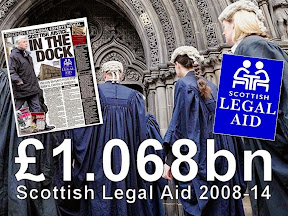
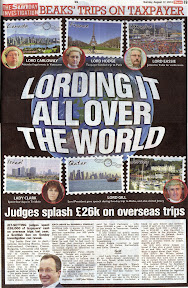


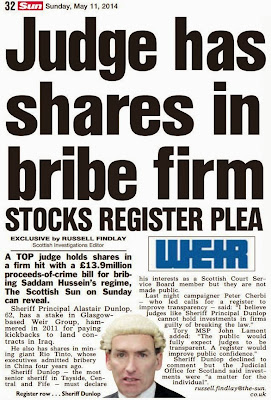











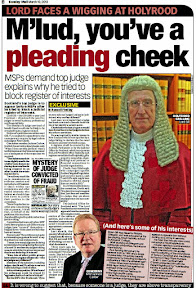
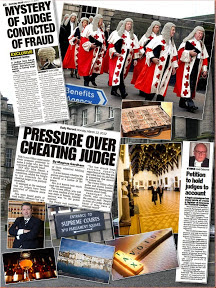
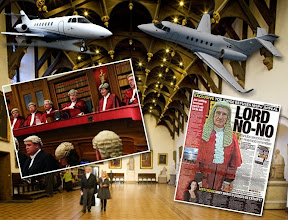


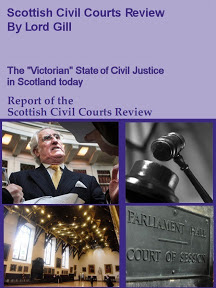
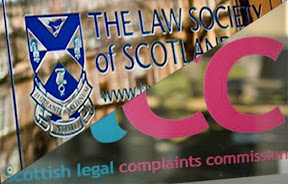



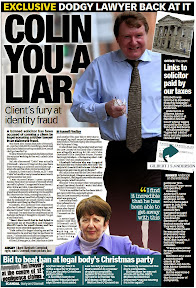
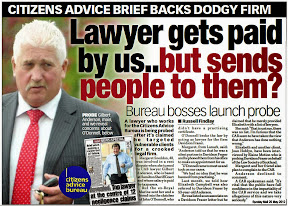



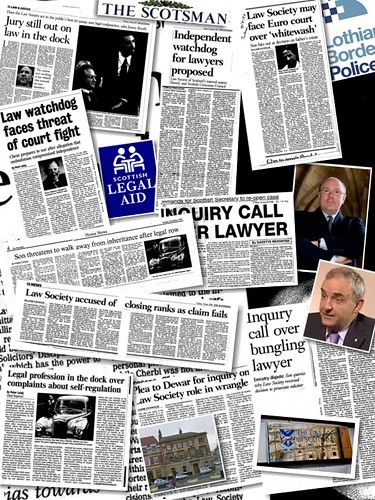




You must be logged in to post a comment.